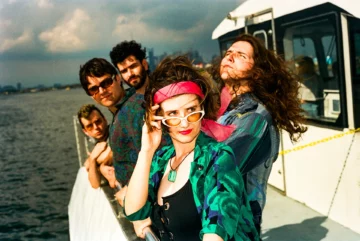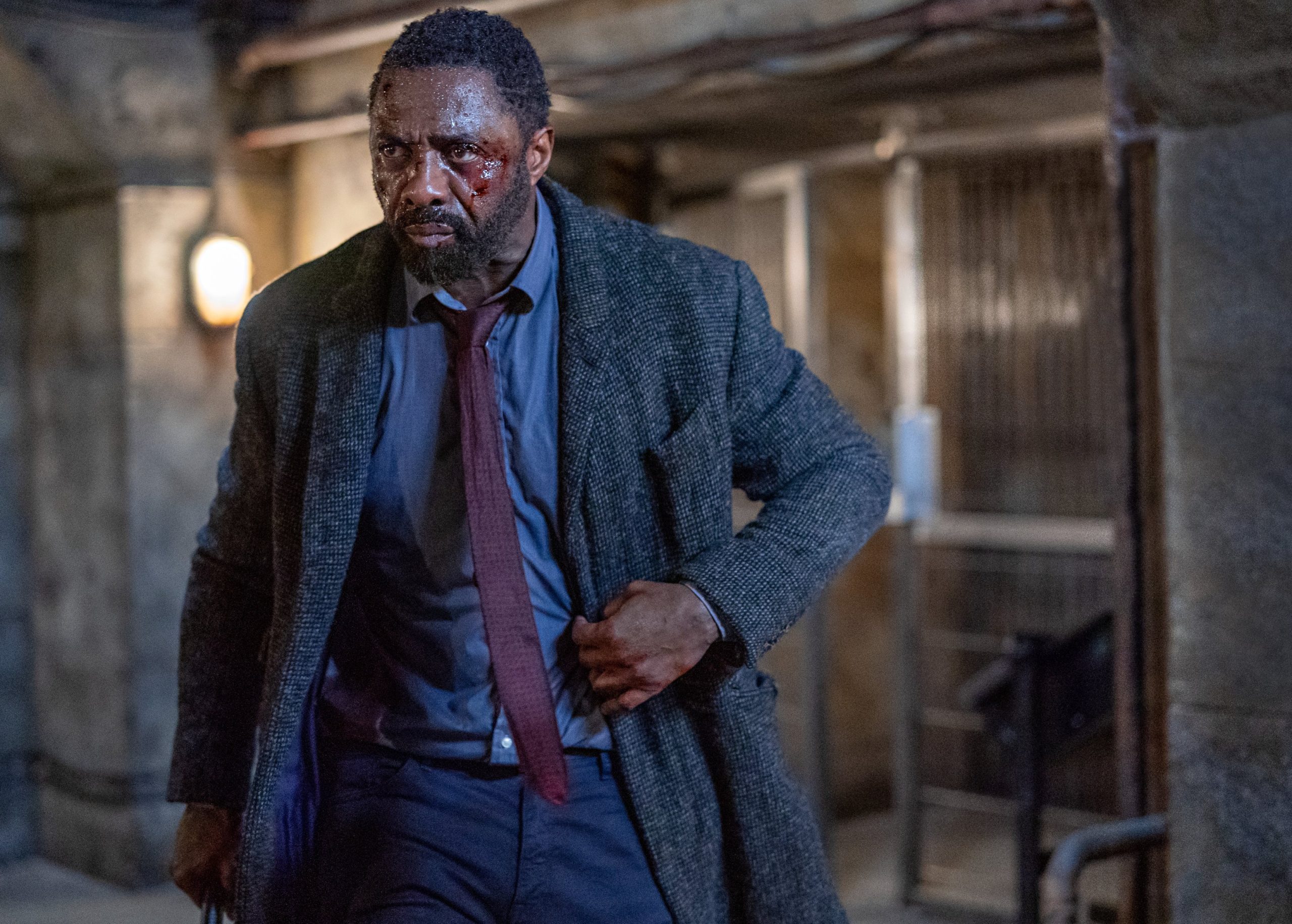
Luther: The Fallen Sun is available to stream on Netflix from this Friday. We spoke to series creator and writer Neil Cross and director Jamie Payne about DCI John Luther’s journey to the big screen.
It’s been over 4 years since we saw DCI John Luther arrested and sent to prison at the end of series 5 of the highly acclaimed British crime series. Luther made Idris Elba into a household name and he returns to reprise his role in the big screen continuation of Luther’s story. We caught up with director Jamie Payne and creator/writer Neil Cross to chat about bringing their small-screen hero to the silver screen.
Congratulations on the film, I was on the edge of my seat the entire runtime. I want to start by asking, how did you manage it?
Neil Cross: I’ll leave the practicalities and the wiser answers to Jamie, but the easy part of the answer is by never taking the audience for granted. Never be content to just shuffle up a variation of what you’ve done before. There’s a musical element to it; the underlying melody is always the same because it’s Luther. It’s got to be a song in a similar genre, but we always want to find new variations, new ways to tell those stories, new situations to find them in and new bogeymen.
Jamie Payne: One of many things that I love about Luther as a character is the timeless hero in him, the fact that he’s willing to push himself beyond his natural ability to protect you from those monsters. This film gives us a chance to really invest in what he’s willing to do. And there’s so many other facets that get to be explored, the film allows you to sit with and follow that freight train that is Luther.
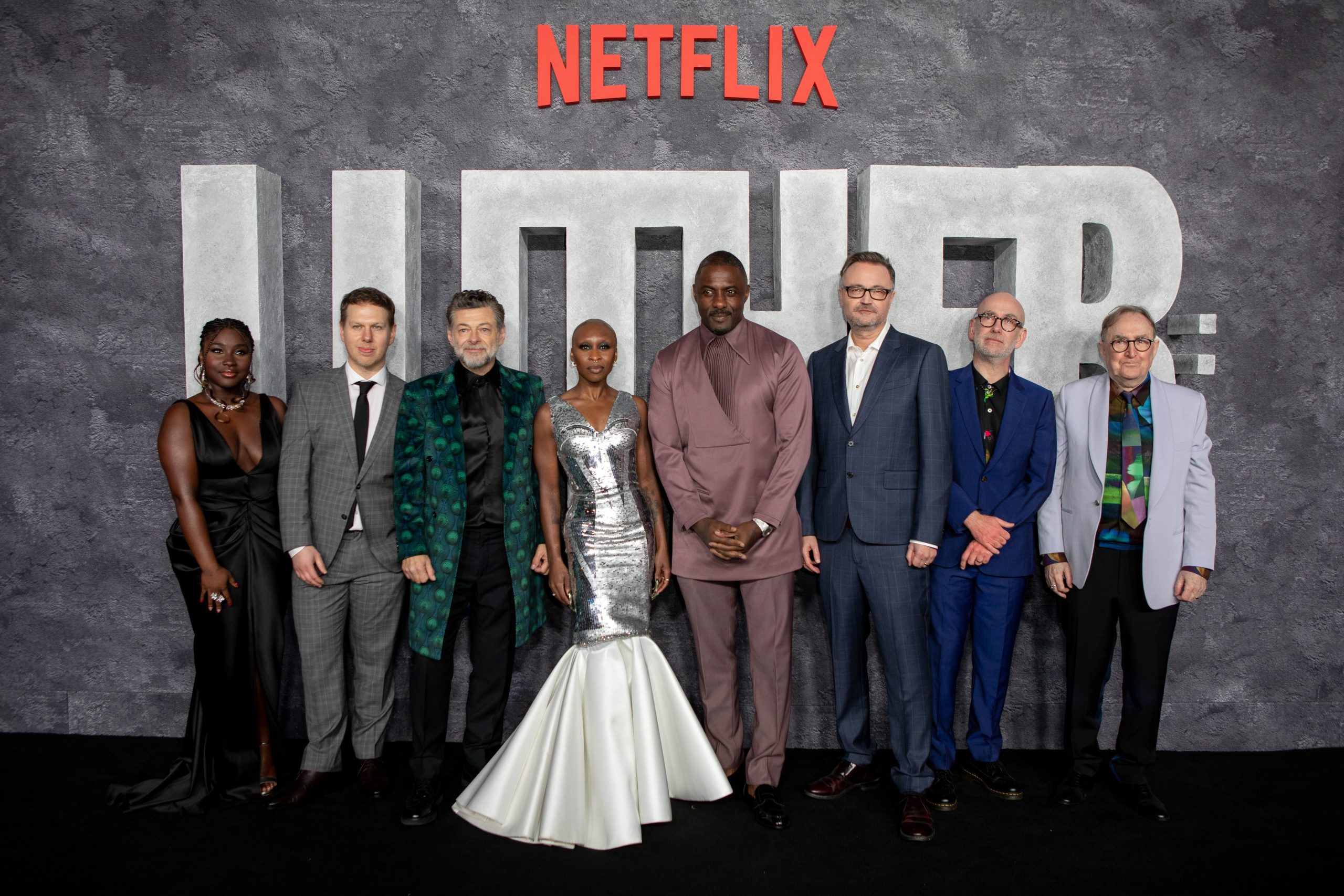
(L to R) Lauryn Ajufo, Thomas Coombes, Andy Serkis, Cynthia Erivo, Idris Elba, Jamie Payne, Neil Cross and Dermot Crowley attend the UK World Premiere for Luther: The Fallen Sun at BFI IMAX on March 01, 2023 in London, England. (Photo by StillMoving.Net for Netflix)
Luther is not a traditional hero. We glimpsed him in the trailer during the prison escape, and it looked like maybe he’s got these superhuman powers now. How do you stay true to that character, that morally murky detective?
Neil Cross: Jamie, Idris and I have known each other and John Luther for a long time. All of us feel a profound loyalty to him and a fondness to him. The first order of business in making the movie was that no matter what we do, no matter how broad a canvas, no matter how much we change his world, that we are always true to who he is. The escape scene speaks not to his superpowers, but to his essential characteristic, which is refusing to stop. It’s one thing to have access to money and equipment and an entirely different thing to make a scene like that primarily about character. And that’s what Jamie pulled off in every frame.
Jamie Payne: Luther does what he believes is right. We were asked a question by somebody new to the Luther stories, really early on in the process of Neil writing this film, and it was like, doesn’t Luther want to get out and show that he’s innocent?
Here’s the thing, Luther doesn’t believe he’s innocent. He doesn’t feel that he’s morally right. He just knows that he has to do what he has to do in order to pursue that. And I think that makes him a timeless hero. But it also makes him a more interesting one, because we can connect to the kind of human frailties of him.
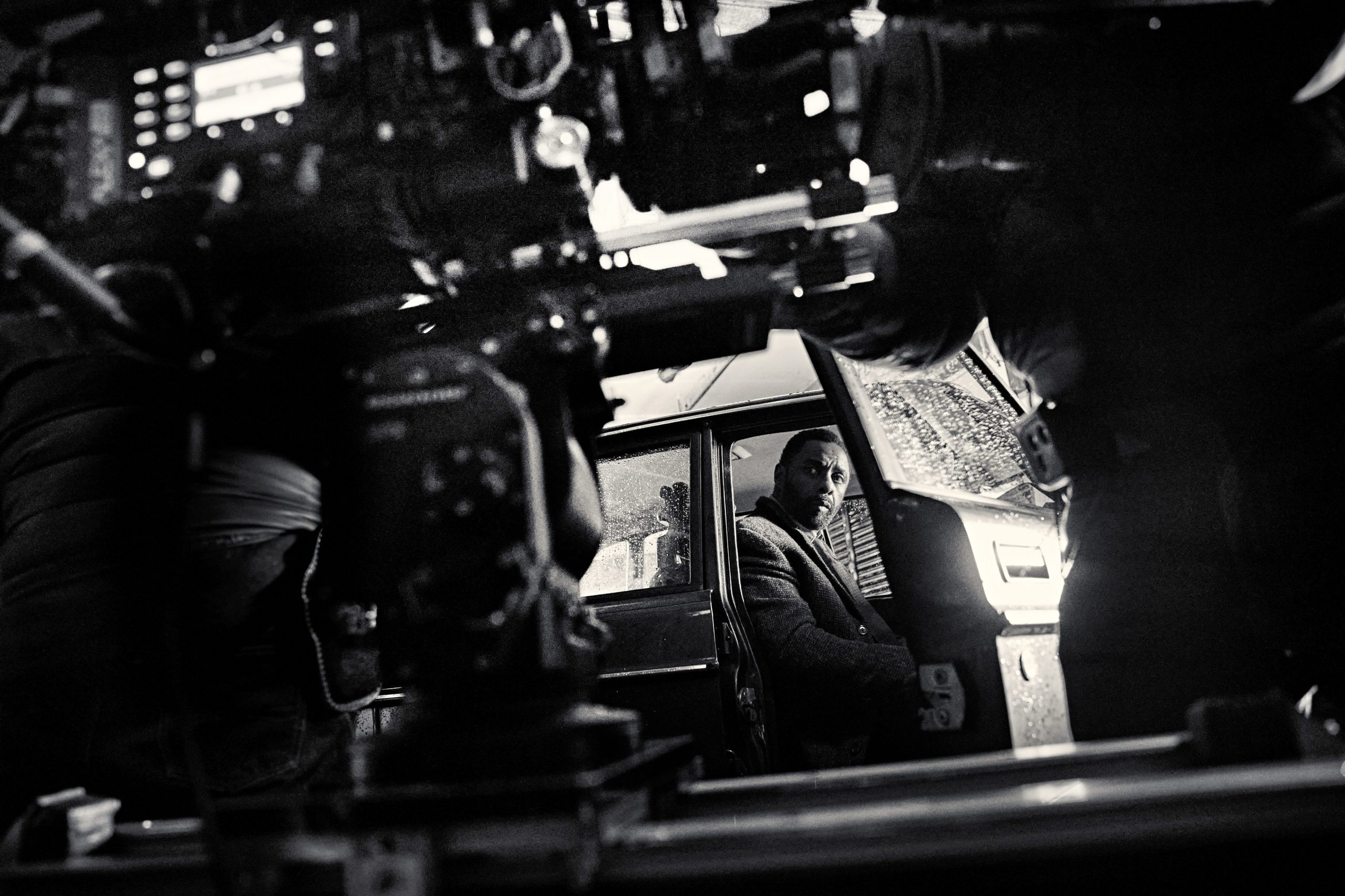
Luther: The Fallen Sun. Idris Elba as John Luther on the set of Luther: The Fallen Sun. Cr. John Wilson/Netflix © 2023
How has Luther changed from series one to where we find him at the beginning of the film?
Neil Cross: I don’t want to make myself sound like more of a controlled writer than I am, but if you look at the arc of the character over the show, he hasn’t followed a moral arc. He’s followed an arc towards self-knowledge. He is a man who has learned, first to recognise, and then to accept his own nature. When you watch episode one of season one, there’s a character called Alice and the first thing she does is to confront him with some truth about himself that he has not yet been able to face. She lights a fuse, which burns throughout five seasons and comes to fruition in the movie; Luther knowing who he is, and he’s no longer in denial.
There’s such interesting themes around Luther’s identity. He can’t save everyone but also that he’s a copper, and he always will be a copper. So did you want to take that a little bit further with a film?
Neil Cross: I think he uses copper as a kind of honorific. He doesn’t mean a serving police officer, he means that there’s something in his soul that feels a compulsion to put things right and to punish those who hurt people. He’s got a calling and it’s not something he chooses. It’s something which is destructive both to him and famously the people around him, they’ve dropped like flies. When he says in the film, I’m a copper and Raine says, not anymore. He is. He’s just not a police officer.
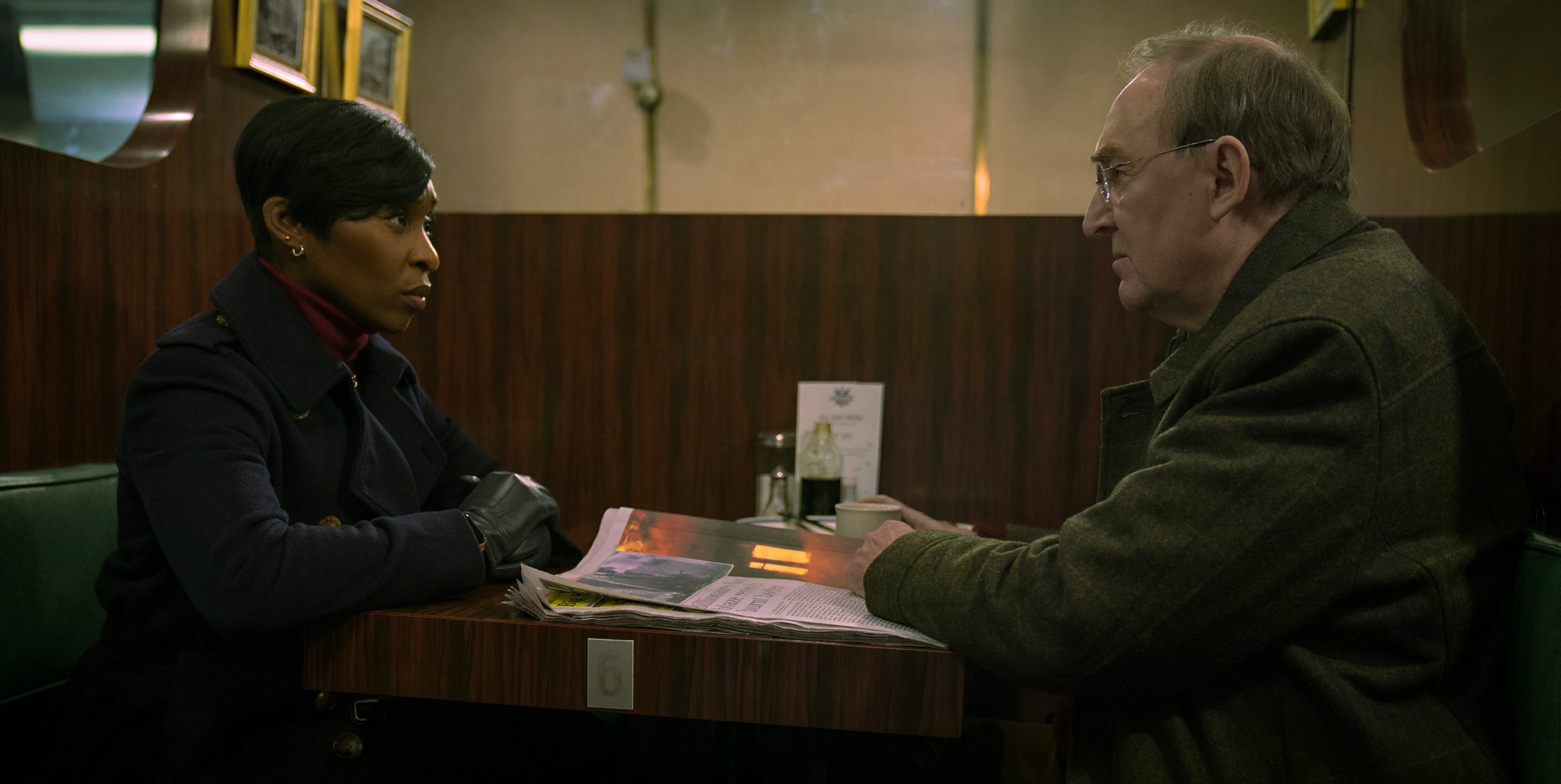
Credit: Netflix
I believe you and Idris have been talking a long time about making a Luther film. When did it become inevitable that after season five, it was going to be the Fallen Sun as a film rather than another series?
Neil Cross: I think that we knew with season five, which is the culmination and the best season of the show, that we told our last story of DCI John Luther. We put him through purgatorial experiences and various different permutations, we told that story. We knew, the three of us, that the next step had to be something on a different scale, and would have a slightly different narrative engine behind it. And I don’t think anything’s inevitable until the editing is complete. Jamie, Idris and I just proceeded as if it was going to happen. And I think we pushed it into being through sheer force of will ultimately. I don’t think we ever doubted that it would happen, but we also didn’t sit back and wait for it to happen. We just kept pushing and pushing, slowly and politely.
Did you approach it any differently than you would a season?
Jamie Payne: There’s a particular musicality, and it’s something that I enjoy talking about, to Neil’s writing. The film gave us the narrative length for us to explore certain parts of Luther’s world and Luther himself. And also having the resources because I’ve had the privilege of hearing some great ideas that Neil’s had, that have never made it to the TV series. When you’re balancing out the resource of time, when you’re making television, it’s all about serving the whole and not one thing can imbalance everything else.
Neil Cross: What I loved about what Jamie did, particularly, is there was no assumption that the more intimate scenes were filler between the set pieces. As much love and care and attention and ambition and scope went into two-handers as well as [the scene in] Piccadilly Circus. There’s a scene where Robey (Andy Serkis) sings a Diana Ross song to his wife, which is not an expensive shot to stage, but is one of the most chilling and hilarious moments in the film.
Jamie Payne: Can I share my favourite Luther moment? I’ve never said this out loud, I’ve never even said this to Neil, although he wouldn’t be surprised. There’s a moment where Corinne says, Please tell me that’s not true, please tell me it’s not that cruel. Idris just looks at her and knows the weight of the reality of that and recognises it, feels it and doesn’t say a single thing. He just makes a little shift. His performance in that moment is absolutely stunning. It’s extraordinary. That is one of my favourites and that’s one of the quietest moments in the whole film.
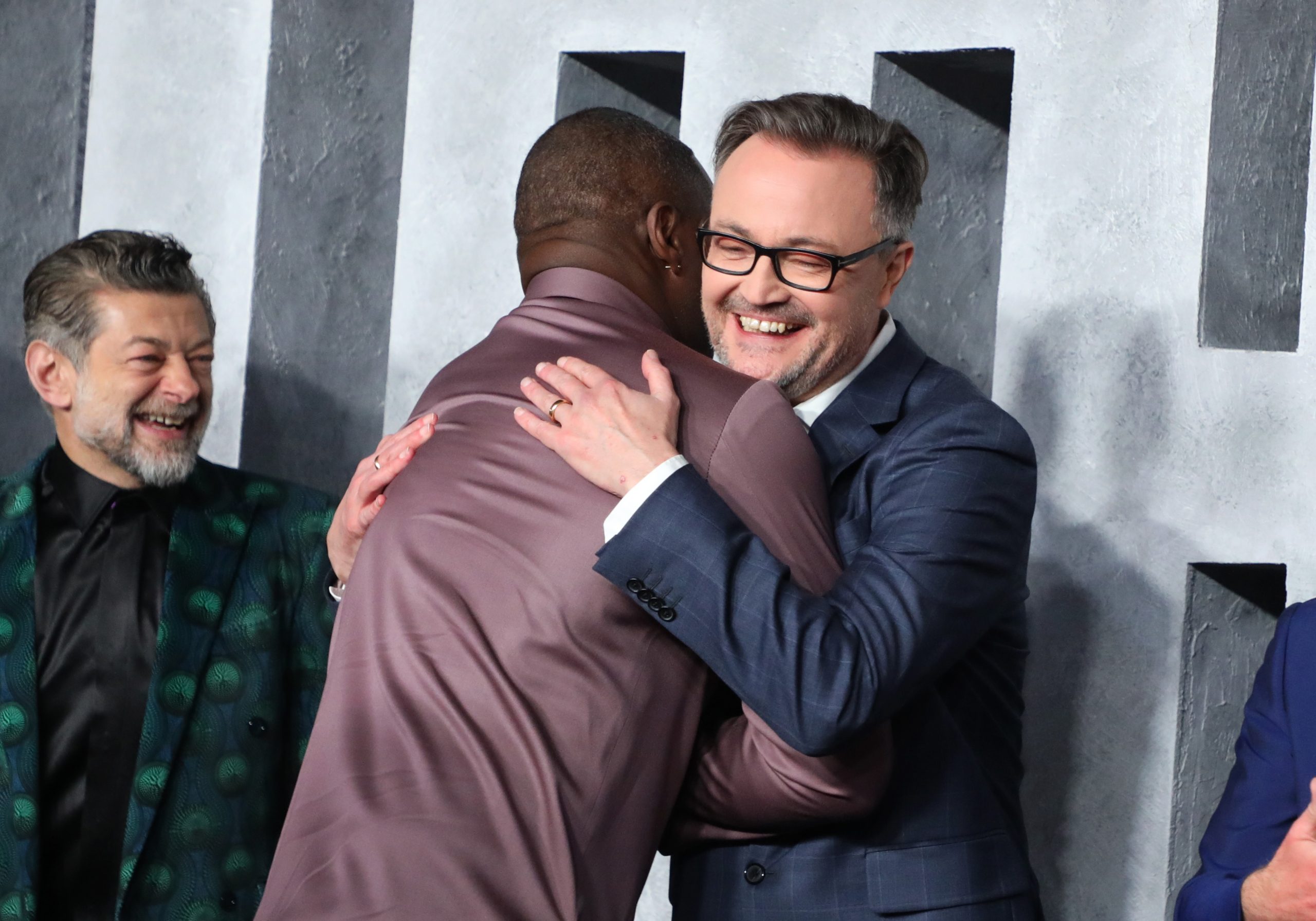
(L-R) Andy Serkis, Idris Elba and Jamie Payne attend the Global Premiere of “Luther: The Fallen Sun” at the BFI IMAX Waterloo on March 1, 2023 in London, England. (Photo by Lia Toby/Getty Images)
What’s also interesting is that when I was a teenager, TV and film were very separate things. Film was like an event, but that’s changing now with Marvel and Star Wars for example, going to almost exhausting lengths with their shows and films. Is that gap between film and TV closing?
Neil Cross: Speaking for myself, not the show and certainly not for Jamie. I don’t align us with anything happening in the world. Honestly, I don’t care. The industry is changing, things are happening on different platforms in different ways. Things will develop, things will tower and fall, things will effloresce, collapse. There’ll be surprises and astonishment. The industry is always going to be dynamic, it’s always going to change. And we will continue to plough our little furrow through it in our own little way.
Jamie Payne: I don’t think anything Neil’s written has been in response to what the current climate is. The lovely thing is we both love television, as well. There’s a joy in enjoying it and the celebration of it.
Neil Cross: We’re never going to be the people that look at what other people are doing.
Luther: The Fallen Sun is now in cinemas and available on Netflix March 10.

